How To Clear A Blocked Toilet
Dealing with a blocked toilet can be frustrating, but our comprehensive guide will show you the simplest and most effective methods to clear the clog yourself. From plungers to natural cleaning agents, find out how to tackle toilet blockages like a pro.
A blocked toilet is one of the most common yet dreaded household inconveniences homeowners face. It often strikes at inopportune times and can cause great stress and mess if not dealt with promptly.
Yet, despite its nuisance factor, clearing a blocked toilet doesn’t necessarily mean an emergency call to the plumber. With a few handy tools, some know-how, and the proper technique, you can transform this unsavoury predicament into a manageable (and even empowering) DIY project.
In this comprehensive guide, we’ll walk through the steps to tackle toilet blockages head-on. From understanding the mechanics behind the flush to mastering a plunger and exploring alternative methods for those stubborn clogs, we’ve got you covered. Whether dealing with a minor blockage or something more stubborn, this article will teach you how to clear the way and keep your toilet running smoothly.
So, roll up your sleeves and get ready to dive into the world of DIY toilet unblocking. By the end of this guide, you’ll know how to clear that pesky clog and prevent future toilet troubles, ensuring that the only thing flushing away is the water down your drain.
Why Does A Toilet Clog?
A clogged toilet can quickly become a minor inconvenience that becomes a major problem. When waste and debris, such as toilet paper, organic material, or non-flushable items, accumulate and obstruct the water flow through the toilet drains, the toilet clogs.
If not addressed promptly, an overflowing toilet can lead to a risk of toilet overflow and potential water damage, which can also be a sign of more severe plumbing problems. The water pressure should be strong enough to clear the pipe’s edges, but when a clog forms, it hinders the system’s efficiency, leading to a blocked toilet .
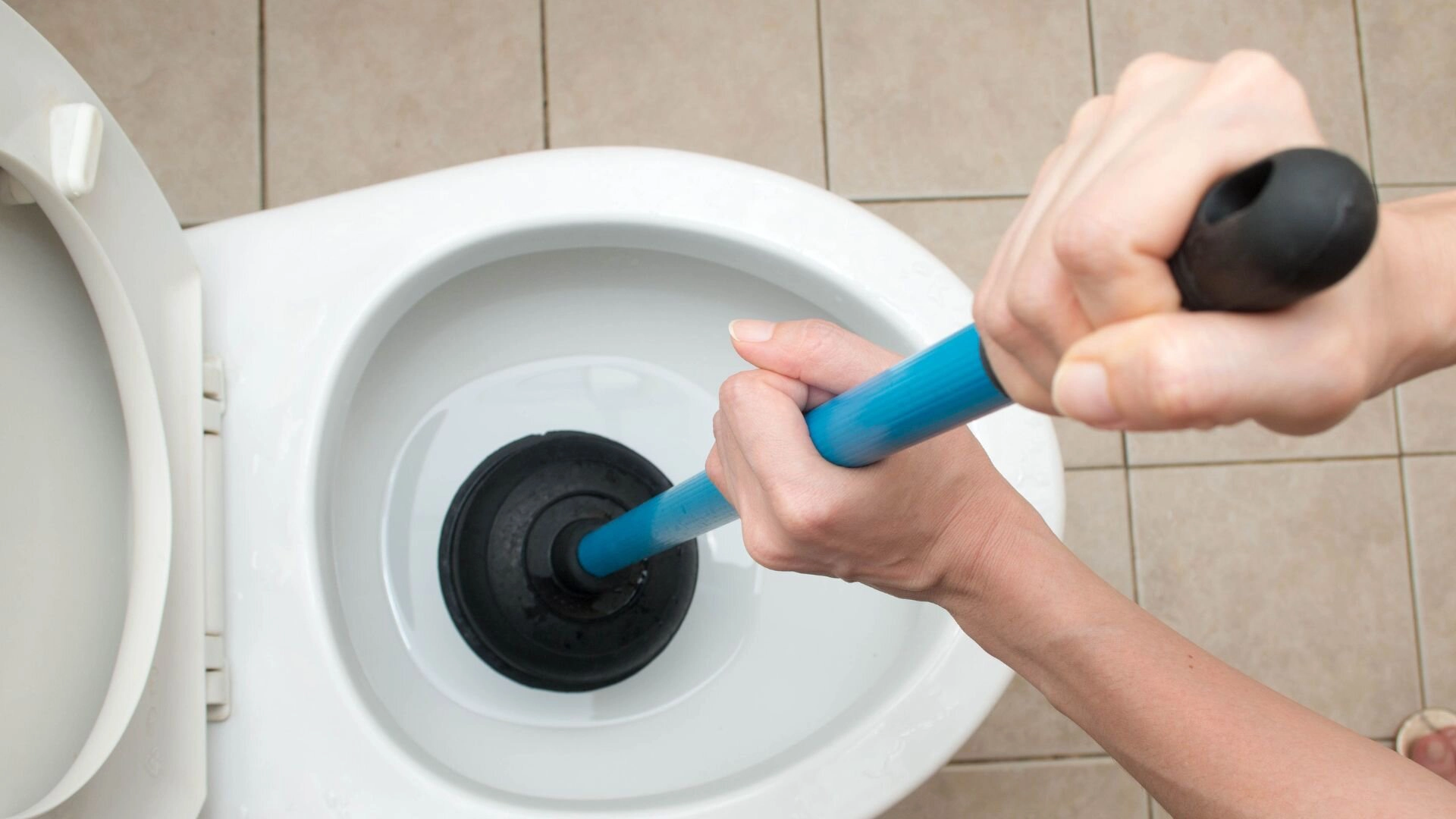
Toilet Bowl Blockage: Causes and Immediate Actions
Upon discovering a blocked toilet, the first reaction may be an alarm as the toilet bowl fills with dirty water. Immediate action is crucial. Shut off the water supply to avert an overflowing toilet and prevent further bathroom flooding.
The toilet tank holds the water supply, and one can stop the water flow by removing the tank lid and closing the valve. Once the imminent risk of toilet clog overflow is managed, inspect the toilet bowl for apparent signs of blockage, such as excess toilet paper or other waste and debris build-up. This hints at the right approach for unclogging blocked toilets.
DIY Solutions for Unblocking Clogged Toilets
When faced with a badly clogged toilet, the urgency to restore functionality is paramount. Homemade drain cleaner concoctions can be surprisingly effective. A popular DIY solution involves half a cup of baking soda and one cup of vinegar, creating a fizzy reaction that can help break down the clog.
For a hot water trick, it’s recommended to use boiling water, but not boiling, to prevent cracking the porcelain. Carefully pour the hot water into the bowl from waist height to generate enough force to dislodge the clog.
Wear rubber gloves, and use a wire coat hanger or a DIY drain snake fashioned from it to navigate through the toilet drain and dislodge the obstruction . A plunger handy in the bathroom can also apply downward pressure and work the clog free.
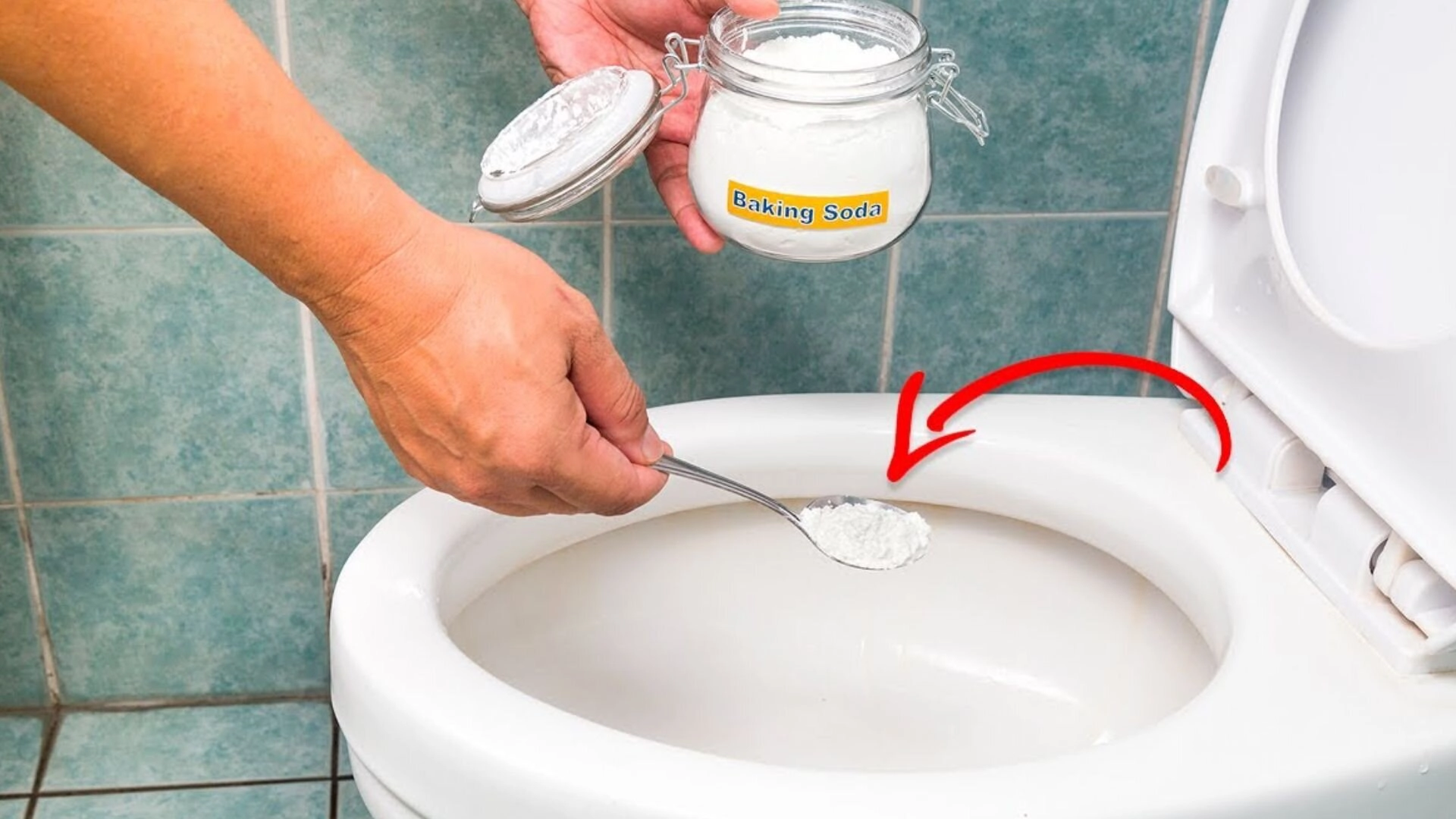
The Role of Dish Soap and Hot Water
Using dish soap and hot water is an innovative approach to unclogging a toilet without a plunger. Pour about a half cup of dish detergent into the toilet bowl, followed by a bucket of hot, but not boiling, water.
The soap acts as a lubricant, helping to break down the blockage, while the hot water assists in dissolving the soap and softening the clog. This method can be particularly effective for organic and toilet paper clogs, as dish soap can help separate these materials from the toilet drain walls.
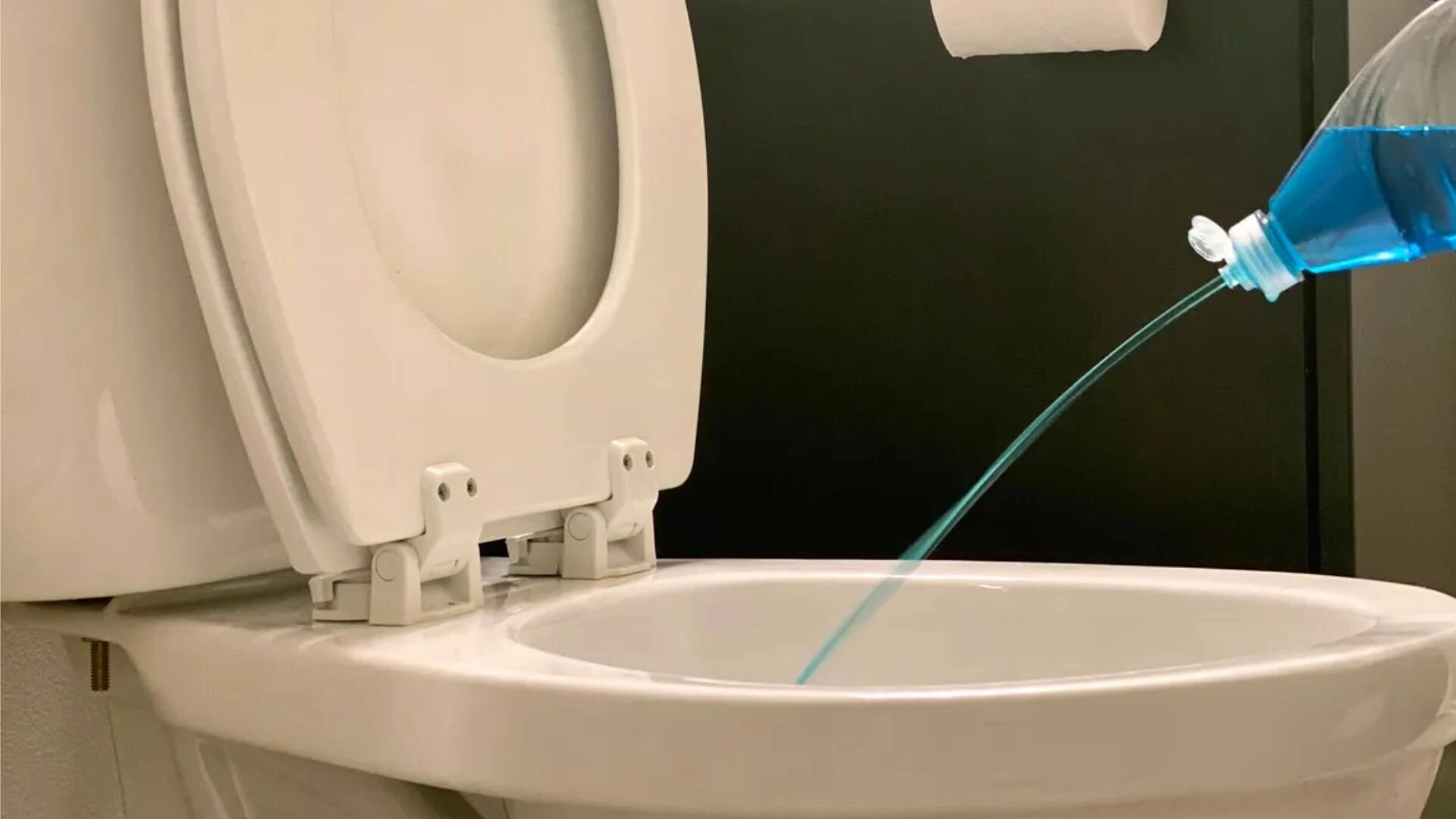
Advanced Techniques: Toilet Auger and Plunger
For more challenging clogs, a toilet auger, a toilet snake or a plumbing snake is a specialised tool designed to navigate the complex curves of toilet drains. It extends deeper than a standard wire hanger or DIY drain snake, reaching clogs further down the drain.
To use a toilet auger, insert the end into the toilet bowl and crank the handle to extend the snake through the blocked drain. Once you feel resistance, you’ve likely reached the clog.
You can maneuver the auger and apply some force to break through the clog or hook it and pull it out. Ensure the rubber cup of the toilet plunger forms a good seal around the toilet bowl opening, and use vigorous and steady plunging motions to create the necessary suction and pressure to dislodge the blockage.
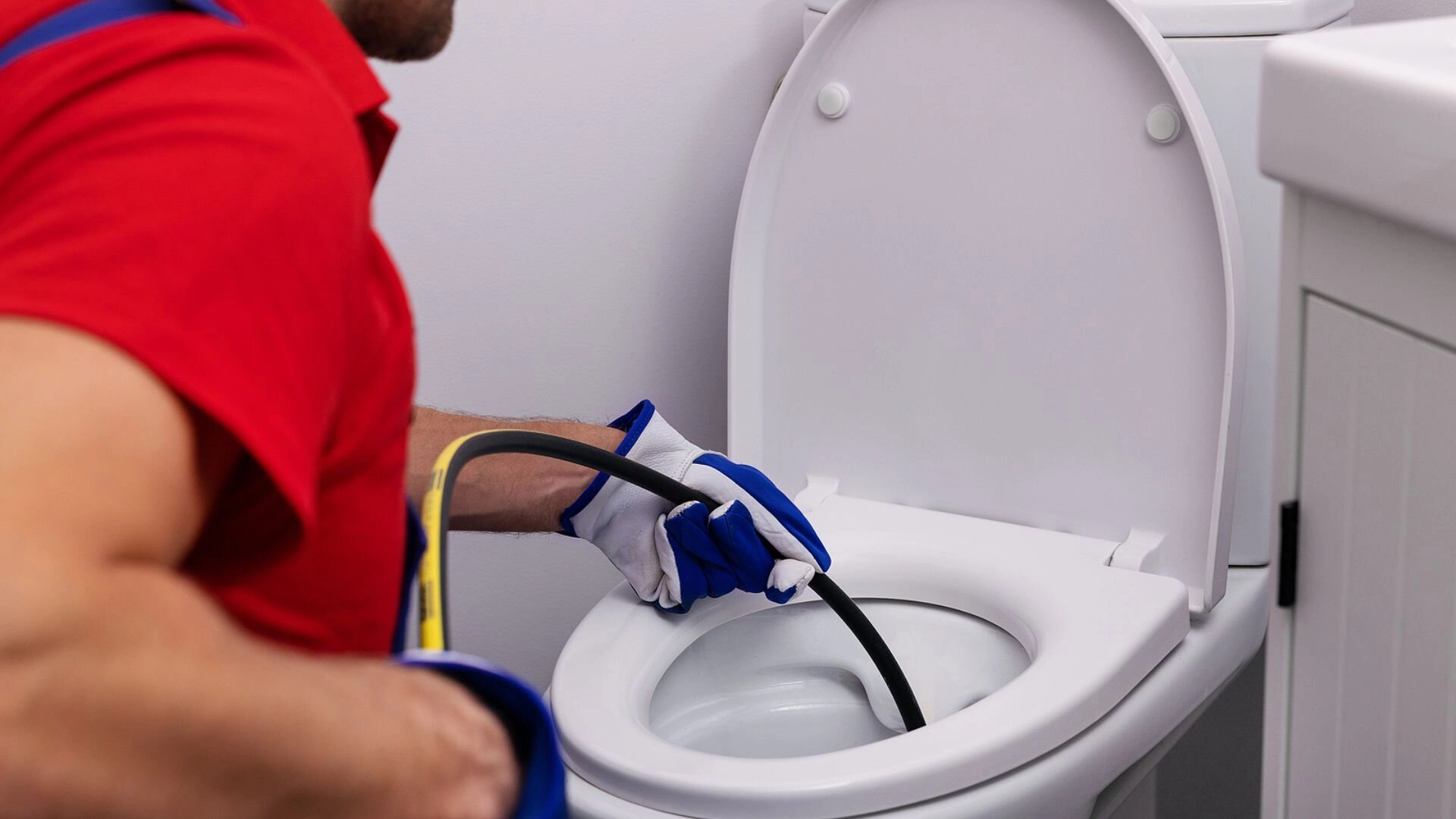
Safety First: Rubber Gloves and Precautions
Prioritising safety and hygiene is critical when dealing with a blocked toilet. Wearing rubber gloves protects against germs and prevents direct contact with dirty toilet water. A bucket and paper towels are always ready to clean up spills or overflow.
Next, fill a large plastic bottle with warm water. Place your thumb over the top of the bottle and fit the top end of the bottle into the outlet at the bottom of the toilet.
If you’re using chemical cleaners, use them sparingly to avoid damaging your pipes or the environment. These chemicals can corrode the pipe’s edges and may not be effective against all types of clogs, particularly those caused by physical objects. Although using a vacuum hose may seem overkill, remember that the clog has withstood all your efforts.
When to Call a Professional Plumber
It’s important to know when a clog is beyond the capacity of home remedies. If the clog persists after multiple attempts with a plunger, toilet auger, or homemade solutions, it might be time to call a professional plumber .
They are equipped with advanced tools, such as industrial-grade clogged drain snakes and hydro-jets, that can tackle the most stubborn clogs without damaging your plumbing system. Additionally, a professional can assess whether underlying issues, such as problems with the main sewer line or septic system malfunctions, contribute to recurrent clogs.
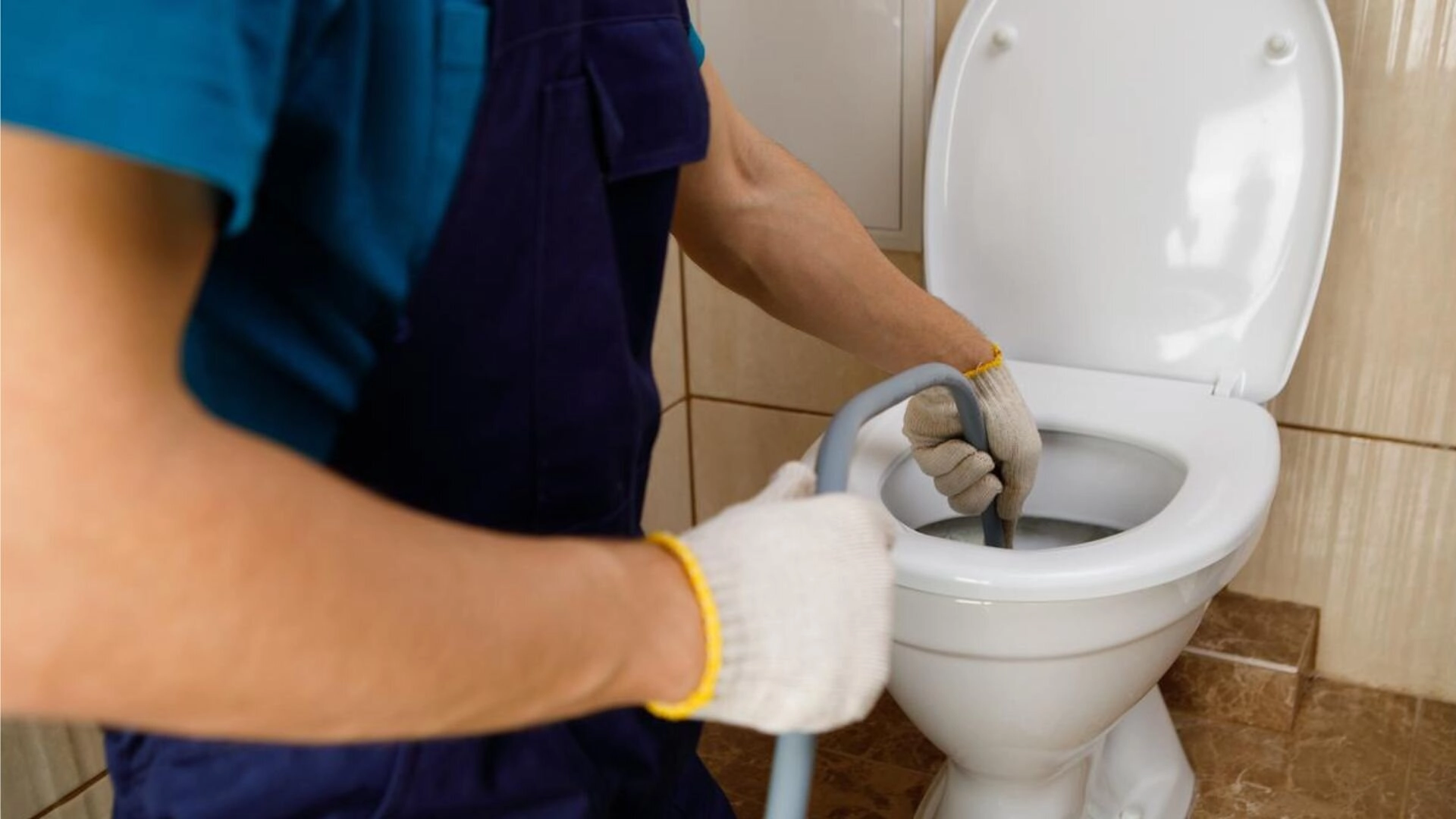
Preventative Measures for Toilet Drains
To prevent future clogs, adopting good toilet maintenance habits is essential. Regularly using a toilet brush can help prevent waste accumulation. Educate household members about what can and cannot be flushed—only human waste and toilet paper should go down the toilet.
Flushing large amounts of paper, sanitary products, wipes, or other non-flushable items can quickly lead to a blocked toilet. Consider a monthly routine of pouring a baking soda and vinegar solution down the drains to keep them running smoothly.
Bathroom Sink: Preventing Clogs
While the toilet is often the primary focus, the bathroom sink is also prone to clogs. A combination of soap, toothpaste, hair, and other debris can build up in the sink drain.
Just like with the toilet, hot water and dish soap can be used to maintain clear pipes . Squeeze about a quarter cup (or as much as you can) as close to the hole as possible. Periodically clean the sink with a baking soda mixture or Epsom salt to help dissolve any grease or build-up. A bathroom sink should have a drain stopper with a catch to help trap larger debris; cleaning this regularly can also prevent clogs from forming.
Don’t Let a Clog Bog You Down
As we’ve navigated the murky waters of toilet blockages together, it’s clear that with the right approach and a bit of elbow grease, most clogs can be conquered without professional help. But, sometimes, a blockage is too stubborn, or you might need more time or inclination to tackle it yourself. That’s where Service First Plumbing shines.
At Service First Plumbing , our expert team is on standby, ready to swoop in and take care of any plumbing emergency, including the most tenacious toilet clogs. We pride ourselves on providing prompt, efficient, and friendly services to get your bathroom back in working order with minimal disruption to your daily life.
Remember, while DIY methods are great for minor issues, persistent or recurrent blockages could signal a deeper problem that requires professional attention. Don’t hesitate to reach out to us. Our skilled plumbers have the tools, technology, and expertise to handle any plumbing challenge, ensuring your home’s plumbing system functions seamlessly.
So, if you find yourself in trouble with a blocked toilet or want the assurance of a professional touch. Let us take the hassle out of your hands. We’re here to ensure your plumbing needs are met with the utmost quality and service.
For a worry-free resolution to your plumbing woes, contact Service First Plumbing, where your comfort is our commitment.
FAQs
What is the first step I should take when I notice my toilet is blocked?
The first step is to stop the water flow to prevent the situation from worsening. You can do this by finding the water valve, usually located near the base of the toilet, and turning it off. Then, you can begin troubleshooting using a plunger or other methods detailed in our guide.
Can I use household items to unblock my toilet if I don’t have a plunger?
Yes, several household items can be used to attempt to clear a blocked toilet. Hot water mixed with dish soap can sometimes loosen a clog, while baking soda and vinegar can create a reaction that may clear the blockage. Our guide will provide you with step-by-step instructions on how to use these items safely and effectively.
Are chemical drain cleaners safe to use in my toilet?
Chemical drain cleaners can sometimes clear blockages, but they should be used as a last resort. They can be harsh on your plumbing and the environment. If you choose a chemical cleaner, ensure it’s suitable for unclogging toilets and follow the instructions carefully. Our guide will discuss the pros and cons of using chemical cleaners and provide safer alternatives.
When should I call a professional plumber to deal with a blocked toilet?
If you’ve tried multiple methods, such as plunging and using a toilet auger, without success, it might be time to call a professional. Additionally, if you notice water backing up in sinks or bathtubs when you flush or there are signs of sewage backup, you should contact a plumber immediately. These could be signs of a more severe blockage in your main sewer line.